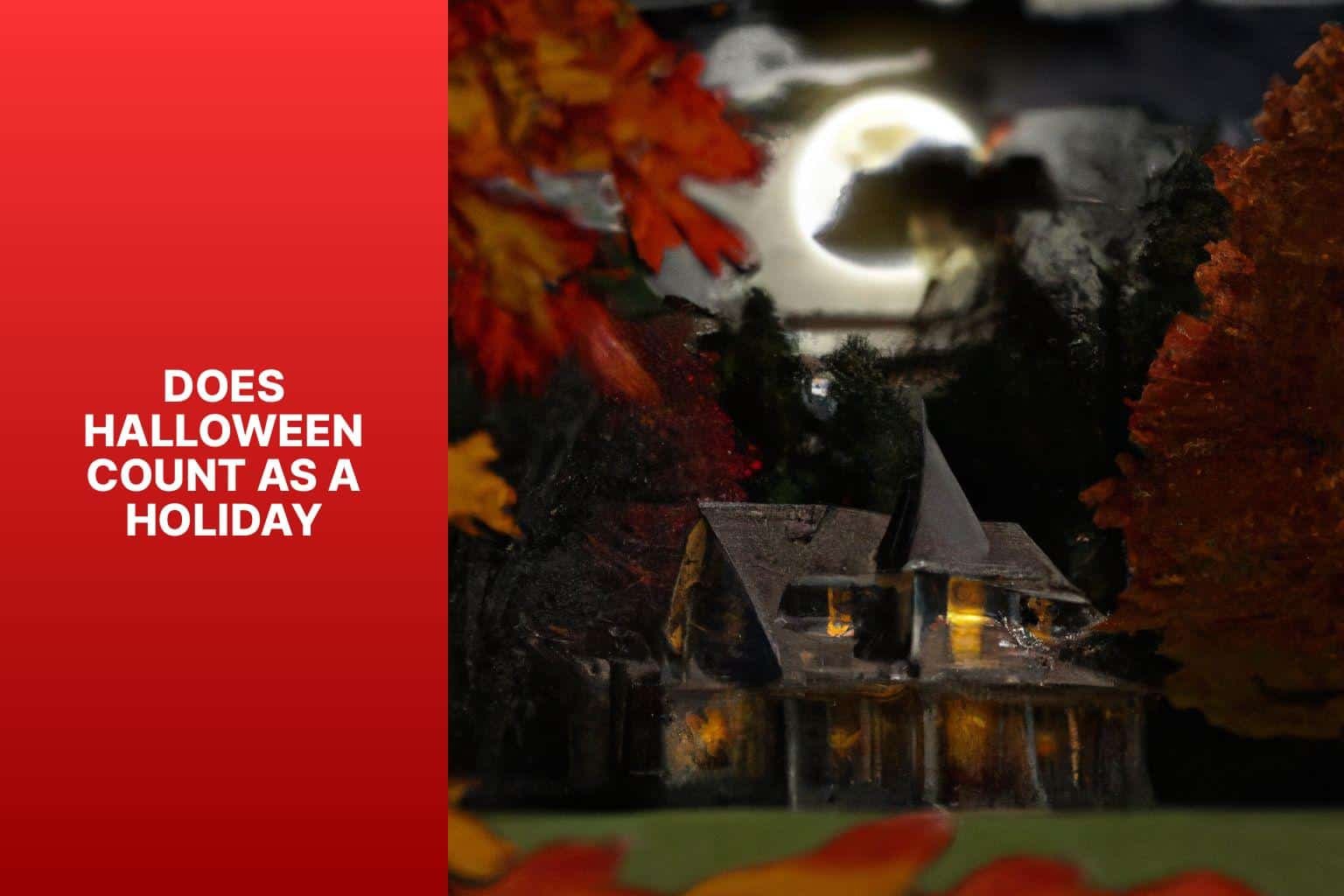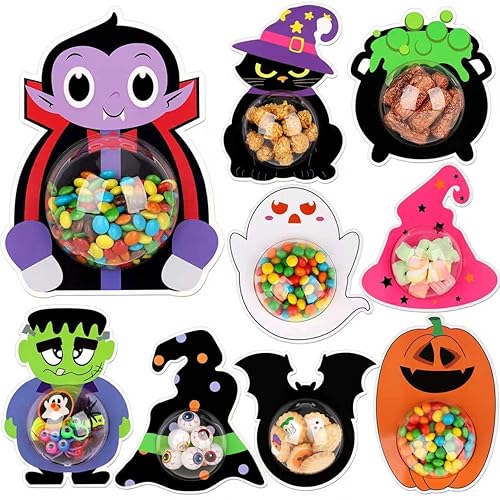Halloween, celebrated on the 31st of October every year, is a holiday that has gained immense popularity in recent times. Before delving into whether Halloween counts as a holiday or not, it is essential to understand what Halloween is and what defines a holiday.
Halloween is a festive occasion rooted in ancient Celtic traditions, marked by costume parties, trick-or-treating, pumpkin carving, and spooky decorations. It has historical origins dating back to the ancient Celtic festival of Samhain, where people believed that the boundary between the living and the dead was blurred. Today, Halloween is widely recognized as a time for fun, creativity, and indulging in thrilling experiences.
To determine whether Halloween is considered a holiday, it is crucial to consider what defines a holiday. Generally, a holiday is a designated day set apart by a community, nation, or culture for observance or celebration. It often holds cultural, religious, or historical significance and is marked by specific traditions, rituals, or customs.
When considering Halloween’s status as a holiday, both its historical origins and cultural significance come into play. While Halloween may not have the same religious or patriotic connotations as other traditional holidays, it holds great cultural significance in many countries, especially the United States. It is celebrated with enthusiasm, bringing communities and individuals together to enjoy festivities and engage in various Halloween-related activities.
Comparing Halloween to traditional holidays, there are both similarities and differences. Like traditional holidays, Halloween involves special decorations, customs, and rituals celebrated annually. Halloween stands apart with its distinct theme of spooky and supernatural elements, making it a unique and enjoyable celebration different from other holidays.
As for being a public holiday, Halloween is not recognized as a public holiday in most countries. It is not typically designated as a day off from work or school. It remains an important celebration in the hearts of many, with its social and commercial impact being significant factors.
Ultimately, whether Halloween counts as a holiday or not may vary depending on personal perspective and cultural context. Regardless of its official classification, Halloween holds great importance as a celebration that brings people together, promotes creativity, and adds an element of excitement to the calendar.
Key takeaway:
- Halloween maximizes creativity and community engagement: Halloween encourages people to showcase their creativity through costumes and decorations while also fostering a sense of community through trick-or-treating and neighborhood events.
- Halloween has cultural significance: Halloween has deep historical origins and is celebrated in many countries around the world, making it an important cultural holiday.
- Halloween is not a public holiday: While Halloween is widely celebrated, it is not recognized as a public holiday in most countries. It holds great importance in terms of individual and community celebrations.
What is Halloween?
Halloween is celebrated on October 31st each year. It originated from ancient Celtic traditions and is now celebrated worldwide.
What is Halloween? During Halloween, people dress up, go trick-or-treating, decorate their homes, and attend parties. The holiday is associated with ghosts, witches, pumpkins, and other spooky elements.
Halloween has historical and cultural significance. It originated from Celtic festivals like Samhain, which marked the end of harvest and the beginning of winter. It was believed that on Halloween, the boundary between the living and the dead was blurred.
While Halloween is not a public holiday in most countries, it is widely celebrated. It brings communities together, encourages creativity, and has a significant commercial impact.
Celebrate Halloween by dressing up, participating in community events, and enjoying the festivities with friends and family.
What Defines a Holiday?
A holiday is a special time set aside for celebration, commemoration, or observance. It recognizes a particular event, tradition, or cultural significance. The definition of a holiday can vary depending on cultural or religious contexts, but it typically involves activities or rituals with meaning for a community.
Several key factors define a holiday. It should have a recognized purpose or theme and serve as a break from daily routines. Holidays often have cultural, historical, or religious significance that is widely understood. They may be based on traditions, beliefs, or historical events. Holidays usually involve communal celebrations, where people come together for shared activities like feasts, parades, or rituals.
What Defines a Holiday?
Is Halloween Considered a Holiday?
Halloween, a time of costumes and spooky fun, often raises a question: Is Halloween considered a holiday? In this exploration, we’ll uncover the historical origins and cultural significance of Halloween. From its ancient Celtic roots to the modern-day celebrations, we’ll peel back the layers of this fascinating occasion. So, grab a pumpkin-spiced treat and join us on this journey into the mystical world of Halloween.
Historical Origins of Halloween
Halloween, with its historical origins rooted in the Celtic festival Samhain, has a rich and intriguing background. The Celts, who resided in Ireland, the United Kingdom, and northern France more than 2,000 years ago, celebrated the commencement of their new year on November 1st. They believed that on the eve of October 31st, the boundary between the living and the dead became hazy, enabling the spirits of the departed to roam the earthly realm once again.
To commemorate this significant event, the Celts engaged in various customs. They lit bonfires and adorned themselves in costumes as a means to deter wandering spirits. They offered food as a gesture of appeasement to ensure a prosperous harvest in the following year. This festival served as a symbolic transition from the bountiful harvest season to the onset of winter.
As time progressed, Halloween underwent a series of transformations influenced by other cultures, including the Romans and Christians. The Romans introduced their own festival called Pomona, devoted to honoring the goddess of fruit and trees. This festival included the popular tradition of bobbing for apples. The Christian holiday known as All Saints’ Day, or All Hallows’ Day, became established on November 1st to pay tribute to saints and martyrs. In due course, the evening before this holy day, All Hallows’ Eve, gradually acquired the name Halloween.
In an Irish town stands a mysterious haunted house, lending credence to the mystical and historical origins of Halloween. Local legends speak of a ghostly apparition, that of a young girl, who allegedly materializes on Halloween night. Numerous witnesses have claimed to have experienced strange phenomena and heard spine-chilling sounds emanating from the house. Every Halloween, curious individuals gather outside in hopes of catching a glimpse of this otherworldly specter. Whether factual or merely a tale passed down through generations, the story of the haunted house intertwines seamlessly with the enigmatic and captivating origins of Halloween.
Cultural Significance of Halloween
Halloween is a holiday of great cultural significance celebrated on October 31st, with ancient roots. Customs and traditions play a vital role during this festive occasion. One particularly popular tradition is the practice of wearing costumes, which not only allows individuals to express themselves but also fosters a sense of community bonding.
Another important cultural aspect of Halloween is the activity of trick-or-treating, where children go from door to door in search of delightful candies. This timeless tradition brings pure joy to children and encourages social interaction with neighbors, thus strengthening community ties.
An additional Halloween tradition with deep cultural meaning is the carving of pumpkins into jack-o’-lanterns. This practice can be traced back to the Irish folktale of “Stingy Jack” and represents the act of warding off evil spirits.
Allow me to share a personal anecdote that truly highlights the cultural significance of Halloween. In my neighborhood, Halloween was always an extravagant celebration. One memorable year, a neighbor transformed their front yard into a haunted graveyard. They embellished it with chilling props, tombstones, and cobwebs, creating an atmosphere filled with an eerie aura. My friends and I would bravely challenge one another to venture through the graveyard, experiencing a thrilling mix of fear and excitement. This unforgettable experience truly exemplified the cultural significance of Halloween and the boundless joy it brings to everyone.
By the way, if you’re interested in learning more about the holiday and whether it counts as a holiday, you can check out this article from National Geographic.
Comparison to Traditional Holidays
When it comes to Halloween, have you ever wondered how it compares to other traditional holidays? In this section, we’ll take a closer look at the similarities and differences between Halloween and other widely celebrated holidays. We’ll uncover intriguing facts and delve into various aspects that set Halloween apart from its counterparts. So get ready to explore the contrasting charms and customs that define Halloween in relation to more traditional festivities.
When it comes to Halloween, does Halloween count as a holiday? Have you ever wondered how it compares to other traditional holidays? In this section, we’ll take a closer look at the similarities and differences between Halloween and other widely celebrated holidays. We’ll uncover intriguing facts and delve into various aspects that set Halloween apart from its counterparts. So get ready to explore the contrasting charms and customs that define Halloween in relation to more traditional festivities.
Similarities to Other Holidays
Halloween shares similarities with other holidays in terms of decoration, traditions, theme, and celebration. Like many holidays, Halloween involves decorating homes and public spaces with spooky items such as jack-o’-lanterns, witches, and skeletons, just as Christmas decorations include trees and lights. Halloween has its own traditions, resembling the tradition of exchanging gifts on Christmas. Trick-or-treating on Halloween night involves going door-to-door and receiving something, much like the act of exchanging gifts. Similar to other holidays, Halloween focuses on horror, costumes, and spooky elements, while Christmas has a theme of joy, giving, and a festive atmosphere. Halloween is a time for celebration and festivities, where people gather with friends and family, dress up in costumes, and have parties or events, similar to how other holidays are celebrated. Considered in terms of similarities to other holidays, Halloween stands out as a holiday worth celebrating due to its unique and fun-filled experience that brings people together.
Differences from Other Holidays
Aspect | Differences from Other Holidays
——————— | —————————————-
1 | Halloween focuses on supernatural themes like ghosts, witches, and monsters, while traditional holidays like Christmas or Thanksgiving have religious or historical themes.
2 | Halloween is associated with dressing up in costumes and going trick-or-treating for candy, which is not common in most traditional holidays.
3 | Unlike traditional holidays with fixed dates or based on religious calendars, Halloween is celebrated on October 31st every year.
4 | While traditional holidays typically involve family gatherings and meals, Halloween has a more community-centric nature with activities like neighborhood parties and parades.
5 | Halloween decorations are unique, featuring spooky symbols like skeletons, bats, and jack-o’-lanterns, as opposed to traditional holiday decorations like Christmas trees or Easter eggs.
6 | Halloween is not a public holiday in most countries, unlike traditional holidays like New Year’s Day or Independence Day.
Is Halloween a Public Holiday?
Halloween: Is it a Public Holiday?
Halloween, celebrated on October 31st each year, holds cultural significance but is not officially recognized as a public holiday like Christmas or New Year’s Day. Originating from ancient Celtic festivals, Halloween has transformed into a holiday known for costumes, decorations, and engaging activities such as trick-or-treating and parties. Despite its popularity, Halloween does not grant a day off from work or school, with businesses and government offices typically remaining open. While some individuals may choose to take time off or engage in Halloween events, it is not universally acknowledged as a public holiday.
Importance of Halloween Celebration

Photo Credits: Rickyshalloween.Com by Lawrence Flores
Halloween, the beloved holiday of spooky costumes and sweet treats, holds a deeper significance beyond its playful facade. In this section, we’ll unravel the importance of Halloween celebrations. Brace yourself as we delve into the community and social aspect, exploring how this holiday brings people together in a ghoulishly delightful way. And hold tight as we uncover the commercial impact of Halloween, revealing the eerie economic implications that lurk beneath the surface. Get ready for a frightfully illuminating journey into the world of Halloween!
Community and Social Aspect of Halloween
Halloween is widely known for its community and social aspect. It serves as a platform to bring people together, fostering connections and allowing them to celebrate as a cohesive group. Various communities organize Halloween events, ranging from costume parties and parades to haunted house tours, all with the aim of strengthening bonds among neighbors and friends.
Halloween transcends age barriers, as people of all ages actively partake in the festivities. Children, specifically, engage in the tradition of trick-or-treating, not only in search of sweets but also to foster socialization and interact with neighbors. Meanwhile, adults take the opportunity to attend parties, using them as a means to socialize and reinforce relationships. These gatherings provide an ideal setting for engaging in conversations, dressing up, and participating in activities centered around the holiday spirit.
An incredible real-life example that truly highlights the community and social aspect of Halloween is the annual Halloween block party organized by a particular neighborhood. This joyful event brings residents together, fostering a sense of togetherness and belonging. It is a chance for everyone to adorn their houses with Halloween decorations, arrange fun games for children, and even share a potluck dinner, further strengthening the communal bond.
Commercial Impact of Halloween
The commercial impact of Halloween is evident in various aspects of the holiday’s celebration and consumer spending. Halloween generates substantial revenue through the sale of costumes and accessories. Retailers offer a wide range of options, from elaborate costumes to simple accessories like masks and makeup. The demand for these items boosts sales for businesses in the fashion and beauty industry.
Halloween-themed decorations, such as pumpkins, skeletons, and cobwebs, adorn many homes and yards. The sale of these decorations contributes to the profit of retailers, home improvement stores, and online marketplaces.
The tradition of trick-or-treating drives the sale of candy and treats. Retailers stock their shelves with a variety of individually packaged Halloween-themed sweets for trick-or-treaters. Confectionery companies benefit from increased sales during this time.
Halloween parties and events are popular during the holiday season. People spend money on event tickets, decorations, food, drinks, and entertainment. Businesses in the hospitality industry, such as bars, restaurants, and event venues, experience a surge in sales due to Halloween festivities.
Pumpkin farms and haunted attractions see a peak in visitors during the Halloween season. These businesses offer activities like pumpkin picking, corn mazes, and haunted house experiences. The revenue generated from admission fees and additional services contributes to the local economy.
Companies take advantage of Halloween’s popularity to promote their products and services through targeted marketing campaigns. This includes television commercials, online ads, and social media promotions. Advertising agencies and media platforms benefit from increased ad revenue during this time.
The commercial impact of Halloween goes beyond these examples, creating business opportunities for various industries and stimulating economic growth.
Frequently Asked Questions
Is Halloween considered a national holiday in the United States?
No, Halloween is not considered a national holiday in the United States.
What is the origin of Halloween?
Halloween originated from the Celtic harvest festival called Samhain, which was observed between October 31 and November 1.
How did Halloween become popular in America?
The celebration of Halloween became more popular in America with Irish immigration in the 1800s.
Are federal government offices closed on Halloween?
No, federal offices like banks remain open on Halloween, even if it falls on a weekday.
Is Halloween a religious holiday?
No, Halloween is not a religious holiday and has no religious connections or historic significance.
What is the estimated number of Americans who participate in Halloween?
In 2019, 172 million Americans planned to participate in Halloween.












